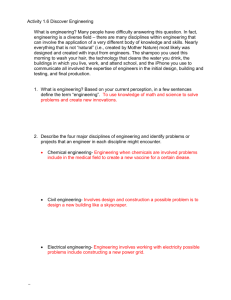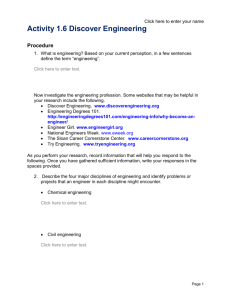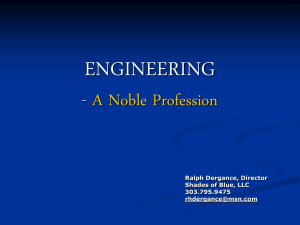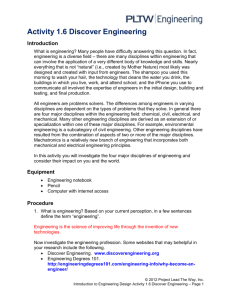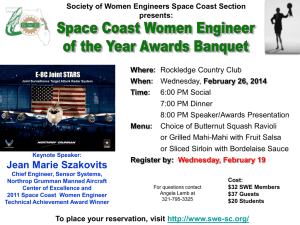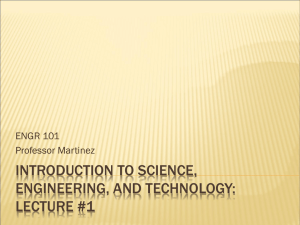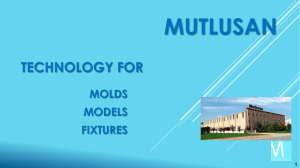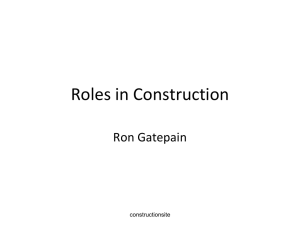ENGR 1310 Lecture 1 - Engineering @ Baylor
advertisement
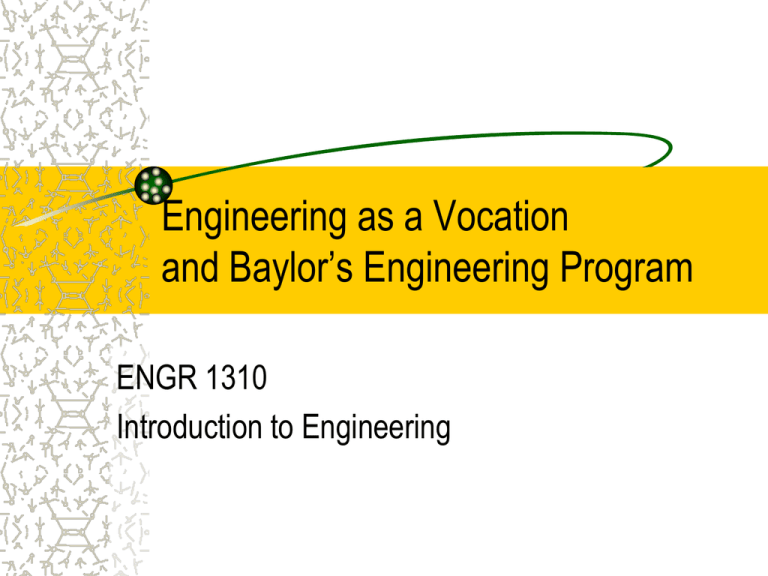
Engineering as a Vocation and Baylor’s Engineering Program ENGR 1310 Introduction to Engineering What is the Difference Between “Job/Work” and “Vocation”? Job American Heritage Dictionary “A regular activity performed in exchange for payment; especially a trade, occupation, or profession.” “A position in which one is employed.” Work American Heritage Dictionary “Physical or mental effort or activity directed toward the production or accomplishment of something.” “Employment; Job.” What is the Difference Between “Job/Work” and “Vocation”? Vocation Originally, a Christian concept. A calling to undertake a certain kind of work as a service to God and mankind. Selected based on how I can best serve rather than strictly on pay or personal enjoyment. Assumes greatest satisfaction and fulfillment in one’s work comes from being exactly where God wants you to be. Why does it matter? “I tell people all the time that money is ultimately not enough compensation for investing your time and energy: there has to be a sense of purpose, meaning, and fulfillment.” Dan Miller, 48 Days to the Work You Love Why does it matter? “Your top priority should be to learn your strengths and weaknesses. Remember, people who only work for money are miserable, because there is no fulfillment or meaning in their career. You must find something that blends your: skills, abilities, personality traits, values, dreams, and passions.” Dave Ramsey, financial coach Why Study Engineering? To become Professional engineer Business consultant for a prestigious consulting firm Lawyer Physician / Dentist To use my God-given gifts and talents to serve others in the best possible way What is Engineering? What is Engineering? “The application of scientific and mathematical principles to practical ends such as the design, construction, and operation of efficient and economical structures, equipment, and systems.” American Heritage Dictionary What is Engineering? “The profession in which knowledge of the mathematical and natural sciences, gained by study, experience, and practice, is applied with judgment to develop ways to use, economically, the materials and forces of nature for the benefit of mankind.” Accreditation Board of Engineering and Technology (ABET) What is Engineering? What is the difference between a mechanical engineer and a mechanic? How does engineering technology differ from engineering? Is an electrician who repairs the air conditioner in your home the same as an electrical engineer? How Does Engineering Differ from Math and Science? Scientist seek scientific truth or knowledge (about how the universe works). Engineers apply scientific truth or knowledge in order to serve humanity. Take time and consider why you would like to be an engineering major rather than a physics, math or biology, or chemistry major… Break into groups of 2 or 3 to discuss this Will ask several of you to share your conclusions The Origins of Engineering Latin in generare Engine Ingenious 200 AD Roman attack on Carthaginians using an ingenious invention (ingenium) 1200s the ingeniator Battering rams, assault towers, etc. The Engineering Disciplines The big three disciplines (a large majority of all engineers are one of these three) Civil Engineering Electrical and Computer Engineering Mechanical Engineering Additional disciplines Chemical Engineering Industrial Engineering Biomedical Engineering Nuclear Engineering Civil Engineering Oldest engineering discipline Civil Engineering Oldest engineering discipline Mechanical Engineering Developed after civil engineering Concerned with the design of mechanical and thermal systems Many final products, such as cars & airplanes Most equipment that makes other products Heating and air conditioning systems Mechanical Engineering Mechanical Engineering Alumna Profile Karen Davis, BSME, 2009 Propulsion test engineer and test conductor SpaceX, McGregor, Texas Karen in Rwanda with Engineers with a Mission “I work on the in-space team, so I work with second stage engines and Draco thrusters for the cargo carrying capsule (the Dragon). As a TE/TC, I am responsible for controlling the many different systems on our test stand that make testing the Draco possible. I will also be doing some design work to expand the test stand for a module of Draco's (five thrusters in flight configuration) and helping to develop a test plan for that series of testing.” Space X Falcon 9 Engines Alumni Profile Jonathan Crabtree, BSME 2009 Level 1 Mechanical Engineer Black and Veatch, Kansas City, KA “I work in the energy division and retrofit projects for older power plants (coal, gas, and combined cycle). Retrofits include emission control equipment (scrubbers for SO2 reduction, SCR for NOx reduction, etc.) and fuel conversion projects. I work on detailed designs, studies, proposals, and also the cost estimate for a new solar thermal power plant that will be the biggest of its kind. I feels that my Baylor education trained me well. Besides starting work, I am getting married in October. Woowho!!” Jonathan and Katie on the Waco Suspension Bridge A Solar Thermal Power Plant Electrical and Computer Engineering Design of electrical systems Very large engineering discipline as all industries will need some electrical engineers Computer portion of this discipline is much newer, having developed since the 1960’s Most work has to do with information, or power, or both Electrical and Computer Engineering Electrical and Computer Engineering Alumna Profile Amy Bowen, BSECE, 2006 Engineer, National Wind Technology Center NREL, Boulder, CO Amy visiting wind farm “I have been a field test engineer for small turbine independent testing at the National Wind Technology Center since September 2007. I am involved in duration, power performance, and safety and function testing for small wind turbines. I am also currently involved in software development for small turbine testing, blade testing, LabVIEW programming, data acquisition, and data analysis.” Large and Small Wind Turbines Alumni Profile Chris Matcek, BSECE 2006, ME/MBA 2008 Engineering Management Trainee Raytheon, San Diego, CA Chris with MBA students in Washington DC “I am member of the Rotational Engineering Leadership Development Program (RELDP). I rotate between three assignments around the USA for 2 years, experiencing different areas of the company. Then I move into management upon graduation. I am currently working on organizational strategy and business continuity for the company.” Raytheon’s KillerBee UAV The Baylor Engineering Program and You Mission Statement The Mission of the Departments of Mechanical Engineering and Electrical and Computer Engineering is to educate students, within a caring Christian environment, in the discipline of engineering, by combining a strong technical foundation with an emphasis on professional, moral, ethical and leadership development. Accreditation ABET (Accreditation Board for Engineering and Technology) Programs are accredited, not schools All three undergraduate engineering programs at Baylor are accredited Curriculum Summary Humanities & Social Sciences Math & Science Engineering Other Min Required Total 18-23 Sem Hrs 32 Sem Hrs 64 Sem Hrs 15 Sem Hrs 129 Sem Hrs Engineering Majors BSECE Electrical and Computer Engineering BSME Mechanical Engineering BSE Engineering Biomedical Option (common with pre-med) Flexible Option Business, Law, Language, Environmental Studies, etc. For the first two years, all three curricula are common with the exception of 2 courses Homework Assignment 1 Read Discussion of The Method (Ch1) By Billy Von Koen Visit computer lab and log onto ECS network View Snapshots of Engineers videos Answer questions Submit to Blackboard by Friday Aug. 27 at 5:00 PM
